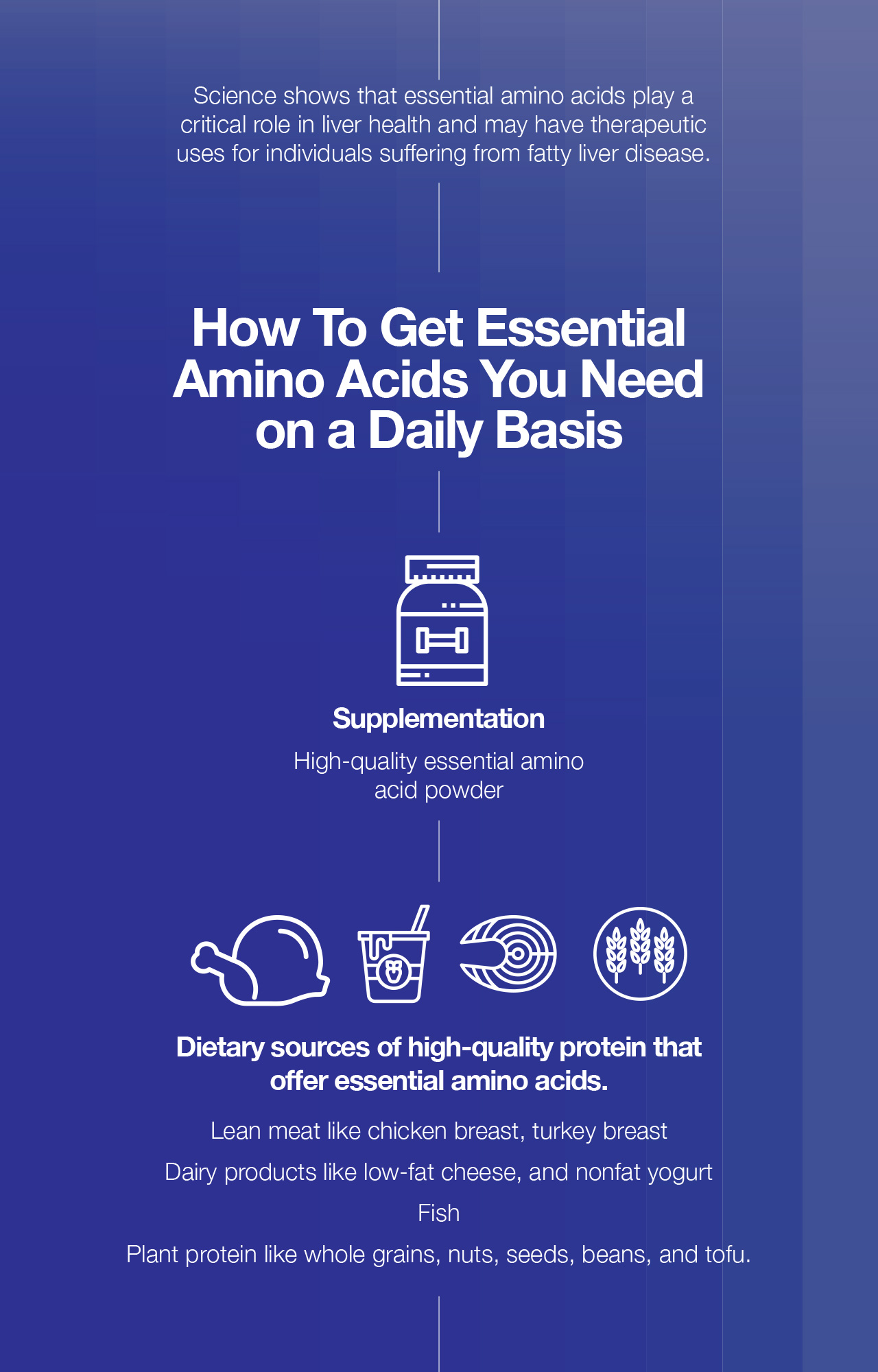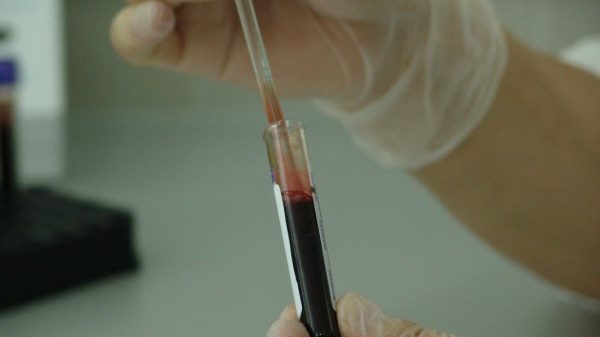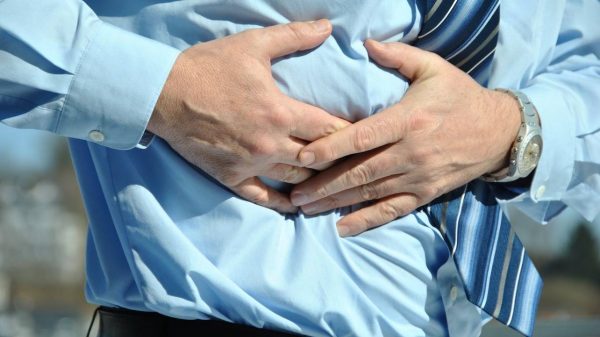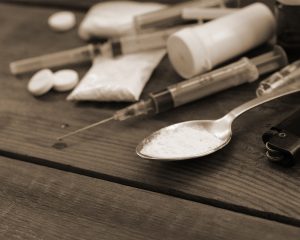Do you have fatty liver disease? If you’ve been diagnosed with this common condition, then you are probably looking for strategies to help reverse the condition. This is where essential amino acids come into play. Getting balanced ratios of essential amino acids on a daily basis may have a therapeutic impact on fatty liver disease.
Read on to learn more about how essential amino acids are beneficial for liver health.
What Is Fatty Liver Disease?
Fatty liver disease – also called hepatic steatosis – is a condition that describes the accumulation of fat within liver cells, or hepatocytes. Fatty liver disease is categorized into two types: nonalcoholic fatty liver disease and alcoholic fatty liver disease. Individuals who develop either form of fatty liver disease may also have a genetic predisposition that makes them more vulnerable to environmental factors that contribute to liver disease.
Nonalcoholic Fatty Liver Disease
Nonalcoholic fatty liver disease (NAFLD) is a form of fatty liver disease induced by diet and lifestyle factors. NAFLD commonly occurs with metabolic conditions like insulin resistance and type 2 diabetes, and is considered to be an indicator of metabolic dysfunction.
In particular, a diet that is high in sugar and saturated fat is associated with fatty liver disease. When we eat too much sugar in the form of added sugars or refined grains, blood sugar levels soar. Chronically high blood glucose levels put stress on insulin while also leading to fatty deposits throughout the body, including the liver. In a nutshell, both sugar and saturated fat negatively interfere with metabolic function and contribute to fatty liver disease.
Alcoholic Fatty Liver Disease
Excess alcohol consumption is the driving factor behind the development of alcoholic fatty liver disease. Alcohol behaves as a toxin in the body, especially when consumed in excess. The liver is one of the main organs affected by excess alcohol consumption. The liver is responsible for detoxifying ethanol and helping prepare it for removal from the body. When you consume more alcohol than the liver can handle, this vital organ becomes overwhelmed and excess ethanol causes oxidative stress in the liver and subsequent damage. As a result, fat builds up within liver cells.
The Progression of Fatty Liver Disease
Both types of fatty liver disease can progress to more serious forms of liver disease if left untreated. Over time, fat accumulation in the liver begins to aggravate liver tissue and cause inflammation. Continued inflammation and damage result in the development of scar tissue in the liver, through a process called fibrosis. The buildup of scar tissue through liver fibrosis eventually causes liver cirrhosis, which is characterized by hardened liver tissue that has lost function. Without proper treatment and intervention, liver cirrhosis can lead to end-stage liver failure, which can be fatal without a liver transplant.
What Are Essential Amino Acids?
Essential amino acids play an important role in liver health. Let’s first go over what exactly essential amino acids are. Amino acids can be thought of as the building blocks of all proteins. Some amino acids are regarded as nonessential or conditionally essential, meaning that these amino acids can be synthesized by the body under most circumstances. During periods of stress, the body may require a dietary intake of conditionally essential amino acids.
On the other hand, essential amino acids are those that the body requires from nutritional sources on a daily basis, in order to carry out nearly all biological processes. Getting optimal ratios of essential amino acids is vital for muscle development, immune system function, and the synthesis of enzymes, neurotransmitters, and hormones.
What the Research Says About the Effect of Essential Amino Acids on the Liver
Research reveals how essential amino acids can have a therapeutic effect on liver health, with particular implications for individuals with fatty liver disease.
In a study published in Nutrition, researchers investigated the impact of essential amino acid supplementation on elderly individuals. (1) Results revealed that in comparison to the control trial, individuals showed a significant decrease in liver fat levels, cholesterol levels, and plasma triglycerides. Interestingly, these changes were observed in the absence of other diet and lifestyle changes. (1)
Additionally, research shows that essential amino acids like histidine and leucine have protective effects on liver tissue by reducing inflammation and fat accumulation. (2)
The benefits of essential amino acids for liver health seem to extend beyond fatty liver disease. In fact, research reveals that certain essential amino acids called branched-chain amino acids may help stop the growth of liver cancer. (3)
In summary, science shows that essential amino acids play a critical role in liver health and may have therapeutic uses for individuals suffering from fatty liver disease.
How Can You Get the Essential Amino Acids You Need on a Daily Basis?
Supplementation is a very effective method to ensure that you’re getting optimal ratios of essential amino acids on a daily basis. A high-quality essential amino acid powder is a great product to incorporate into your routine on a daily basis. Essential amino acid powder can be mixed into your favorite beverages, such as water, coffee, and smoothies.
It’s also helpful to ensure that you’re getting dietary sources of high-quality protein that offer essential amino acids. Lean meat and dairy products like chicken breast, turkey breast, low-fat cheese, and nonfat yogurt are excellent sources of high-quality protein. Fish also offers optimal ratios of essential amino acids as well as anti-inflammatory omega-3 fatty acids.
Essential amino acids can also be obtained from plant proteins. However, unlike animal proteins, vegetable proteins do not offer optimal ratios of essential amino acids in a single source. As a result, it’s important to combine vegetable proteins throughout the day, especially if you’re following a primarily plant-based diet. Excellent sources of plant proteins to incorporate into your diet include whole grains, nuts, seeds, beans, and tofu.
Additional Strategies for Supporting Liver Health
In addition to essential amino acid supplementation, there are strategies you can employ to support liver health.
1. Reducing Sugar and Saturated Fat Intake
Cutting back on your consumption of sugar and saturated fat is a crucial step towards supporting a healthy liver. Reducing your sugar intake encourages more stable blood sugar levels and improved insulin function. Cutting back on your saturated fat intake will also help improve insulin function while also helping to reduce cholesterol and triglyceride levels.
How can you avoid these harmful ingredients that wreak havoc on liver health? To reduce your sugar intake, stay away from foods like ice cream, soda, candy, and sugary breakfast cereals. It’s also beneficial to limit your consumption of refined grains like white rice, white bread, and white pasta.
Saturated fat is found primarily in fatty meats and dairy products like steak, bacon, cheese, whole milk, and butter. Packaged food items and fried foods Avoid these foods
2. Weight Loss
Did you know that weight loss can help improve NAFLD? Achieving a healthy weight can help reduce fat stores in liver tissue and help restore normal liver size. Managing portion sizes, choosing metabolism-friendly foods, and getting plenty of physical activity can help encourage weight loss if you are overweight.
3. Getting Enough Antioxidants
Antioxidants are particles found in food that fight against free radicals and improve overall health. Antioxidants like polyphenols, carotenoids, and vitamin C are particularly abundant in fruits and vegetables. Eating a diet rich in fruits and veggies can help reduce oxidative stress in the liver, support liver regeneration, and fight against fatty liver disease. Examples of fruits and veggies to incorporate into your diet include broccoli, spinach, bell peppers, sweet potatoes, artichoke, apples, kiwi, blueberries, and strawberries.
Everyday herbs and spices that we use for cooking also contain potent antioxidants. Try cooking with herbs and spices like oregano, basil, thyme, turmeric (curcumin), and curry to increase your intake of liver-friendly antioxidants.
4. Limiting Alcohol Intake
Cutting back on or eliminating alcohol consumption is crucial when striving to reverse fatty liver disease. Reducing alcohol intake allows your liver to mitigate oxidative stress and repair from inflammation and fat accumulation.
If you struggle with alcohol abuse or addiction, it’s critical to seek medical care and guidance through detox. Mental health professionals can also be helpful resources in supporting long-term sobriety.
5. N-Acetylcysteine
An individual with NAFLD will often show elevated liver enzymes on blood tests; a sign that the liver is inflamed. Are you wondering how to lower liver enzymes? N-acetylcysteine (NAC) may be key. NAC is a derivative of the amino acid cysteine and supports antioxidant activity in the body. NAC is connected to healthy mitochondrial function and may support anti-aging. Moreover, research demonstrates that NAC may have beneficial effects for individuals with nonalcoholic fatty liver disease. In a study published in Hepatitis Monthly, researchers found that NAC supplementation was connected to lower levels of the liver enzyme alanine aminotransferase. (4)
Research also shows that N-acetylcysteine can effectively treat an acetaminophen overdose. An article published in the New England Journal of Medicine describes how N-acetylcysteine increases the antioxidant glutathione in the liver and improves oxygenation in liver tissue, resulting in a therapeutic effect. (5)
Taking high-quality supplements that offer NAC can help make sure that you’re getting the NAC that you need to promote liver health.
6. Support Gut Health
Liver health and gut health are intertwined. In order to support gut health, it’s crucial to eat plenty of dietary fiber. Good bacteria in the gut feed on dietary fiber, producing anti-inflammatory compounds as byproducts. These beneficial compounds then enter the bloodstream and travel throughout the body to various organs, including the liver. As a result, getting enough fiber can help support a healthy liver. Foods containing probiotics such as yogurt, kimchi, and kefir may also support healthy liver function.
Foods that are rich sources of fiber include fruits, vegetables, whole grains, and beans.
7. Herbal Remedies
Certain herbal remedies are said to support healthy liver function. For example, the active ingredient in milk thistle (silymarin) or milk thistle extract is called silybin and may promote liver health. Dandelion root may also have a detoxifying impact on the liver. Before adding herbal remedies or liver detox supplements to your diet, it’s always important to talk to your physician.
Things to Keep in Mind
It’s always important to undergo testing and examinations with a healthcare professional. Sometimes, underlying conditions like hepatitis b, hepatitis c, hemochromatosis, or autoimmune hepatitis may be contributing to fatty liver disease or liver damage. It’s crucial to identify any underlying conditions to ensure that you’re seeking proper treatment and liver support.
Finally, be wary of fad liver cleanse or liver detox diets that are trending online. Many of these diets tout the use of herbal medicines without proper food intake for a long period of time.
Conclusion: Why Essential Amino Acids Are Important for Liver Support
Essential amino acids are building blocks of protein and are vital components in so many biological mechanisms, including those in the liver. Getting optimal ratios of essential amino acids on a daily basis may help improve liver fat levels, as shown by research. Other strategies for liver support include reducing sugar and saturated fat consumption, taking N-acetylcysteine, and maintaining a healthy weight.

References:
(1) https://www.ncbi.nlm.nih.gov/pmc/articles/PMC2696073/
(2) https://www.ncbi.nlm.nih.gov/pmc/articles/PMC6619856/
(3) https://www.ncbi.nlm.nih.gov/pmc/articles/PMC6088198/























